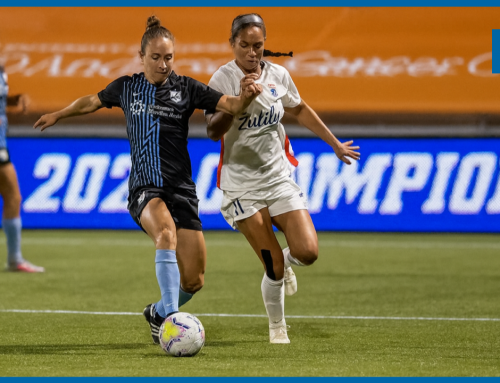Published by the firm Winter – Dávila & Associés
Paris, 15 Juin 2022

Author: Diego Zavala
Lawyer with honors from the Pontificia Universidad Católica del Perú (PUCP), with a thesis entitled “Labor sanctions in off-side: The imminent subordinate disciplinary power of the employer club in the special regime of the professional soccer player”. He has a master’s degree in sports law from the Sports Law Institute and has experience in labor law: he was an assistant at Ernst & Young (EY Peru), assistant professor at the PUCP, co-founder of a web portal dedicated to soccer -in charge of the legal line- and labor arbitration secretary. Currently, he is an associate at Estudio Jurídico Zavala & Asociados.
📍Versions of the article availables in others languages:
🇪🇸 Versión en Español
🇫🇷 Version Française
Do you need lawyers in France? Do not hesitate to contact us!
Despite being a proposal that, at least in the short term, is completely ruled out, the truth is that its introduction during the 71st Congress of the Fédération Internationale de Football Association («FIFA») -carried out virtually in the month of May 2021– has fulfilled its original objective: to put in vogue the change in the periodicity of the celebration of the World Cups for men’s and women’s national teams, replacing its current organization from every four (4) years to half the time, that is, biennially.
In fact, what was proposed at the beginning as an idea “went forward by a very large majority: 166 votes in favor and only 22 against” (Puxeres, 2021). Had it not been for the stakeholders of professional football[1] who spoke out to oppose the swift progress of the motion, that the highest representative of the governing body of this sport, Gianni Infantino, expressed a progressively more conciliatory approach less than two (2) months ago, in the last edition of the event that brings together all the FIFA affiliated federations year after year:
FIFA came to the conclusion that it is feasible, that it would have some repercussions and impacts but once this was certified, the next phase starts and it is a phase of consultation, discussion, trying to find agreements and compromise. In addition to the confederations and the associations, we have the leagues, the clubs and the players present here as well (Infantino, quoted by Olley, 2022).
YOU CAN ALSO READ: The professionalisation of women’s football
Ergo, it is in this stage where it will become necessary to assess the entire variety of elements or factors that would be affected –either positively or negatively– by the temporary variation in the current format of the FIFA World Cups, highlighting, for the proposed purposes of this article, the vacation period of the professional soccer player.
Because yes, in general terms, having the best footballers play every two (2) years for the top national team trophy would be an absolute pleasure for the spectators, a great deal for organizers and sponsors and a recurring reason to unite the soccer nations around the planet. But what if we put ourselves in the shoes of the athletes for a moment? And what if we look at all this from the perspective of the clubs?
Initially, to assess the current situation of the breaks to which professional soccer players are entitled, it is essential, at least in what refers to Peru, to review articles 1°, 5°, 6° and 10° of the Legislative Decree 713, «Consolidation of legislation on paid breaks for workers subject to the labor regime of private activity»[2]; literal a) of article 7° of Law 26566, «Labor regime for professional soccer players»[3]; and articles 9 and 10 of the Statute of the Union Association of Football Players of Peru («SAFAP»)[4], regulations from where we can draw the conclusion that these athletes, have the same treatment as workers subject to the labor regime of private activity, with the right to rest twenty-four (24) consecutive hours a week, enjoy holidays and also thirty (30) days of annual vacations.
However, there is a big difference between the two groups. And it is the moment in which the athletes can enjoy them that is not the same, since “competitions are usually held on weekends [and, in some circumstances, on days off], considering that the concept of professional sport is associated with the leisure time of the rest of the population” (Frega: 1999: 157) so that the match can be viewed by the largest possible audience.
Consequently, the truth is that the athlete’s right to weekly, holiday and vacation rest does not only depend on what his employer alone decides, but it will vary in accordance with the international calendar of matches that organized football and its confederations and/or member federations may– based on factors such as the one indicated in the preceding paragraph, marketing, ticket sales and broadcasting rights, among others – establish for clubs and national teams, as appropriate, shifting the primary decision of when athletes will really rest to FIFA’s own pyramid structure.
In this way, and in accordance with what is stated in articles 2, 3 and 9 of the aforementioned Legislative Decree[5], in the special labor regime of the soccer player it ends up being usual for them to make use of their breaks on dates other than those of “common employees”, respecting the fact that they actually do it on a different day or that, in exchange, the club pays them three (3) daily wages (“one for the rest day, the other for the work done and the last based on a surcharge of 100%” (Arce, 2005: 63)). The same refers to the SAFAP Statute in its 11th article, adding one more day of solace per year for the player: July 18, “Official Day of the Professional Soccer Player”[6].

Photo: pixabay.com
However, the real problem comes in relation to the vacation days, since it is insufficient that article 14 of the Legislative Decree 713 allows the employer to determine the moment in which the worker enjoys these thirty (30) days away from their work obligations[7] or that section 4.7 of FIFA’s Circular No. 1171, obliges the employer to stipulate it in the contract[8].
Let us remember that, even with certain guidelines, it finally ends up being FIFA and its pyramidal structure the one in charge of formulating the match’s schedule; and therein lies the relevance in the discussion related to the reduction of time between one World Cup and another. With that legitimacy, added to the fact that the call-up to a national team or representative team is considered an obligation for the soccer player, outside the contractual labor relationship that he could maintain with a club as an employer, at what point will he be able to make full use of his vacations? As Frega rightly warns:
The main victim [is], of course, the athlete, as they cannot fully enjoy their vacations. But, tangentially, the expectations of his employer are also lowered by having to count on the services of a worker for the next season who not only did not rest enough but was also subjected to the emerging rigors of the highest competition. The Sports National Federation is also harmed by having to resort to a player who did not enjoy a long break and goes to the competition or encounter exhausted without strength as he is at the end of a tough season (Ibídem: 163).
Obviously, FIFA loses sight of the real detriment that these changes generate in all those involved, although, above all, in the athlete, who, as a person and worker, “is generally left without the full enjoyment of an inalienable labor right which are vacations” (Ibídem: 162).
Let us bear in mind that the call for a representative team reaches, above all, world and continental tournaments (World Cup and Copa América, for example), which are commonly held every two (2) years alternately, between the months of June and July – except, of course, Qatar 2022 – when most club competitions have ended and the players should be resting. And that implies, therefore, that the athletes selected by the corresponding national coach must attend, without hesitation, to comply with their federative obligations, partially sacrificing the enjoyment of their vacation period.
YOU CAN ALSO READ: FIFA Agent returns
The paradox of the matter is that in the face of such damage, no one can be charged with that responsibility. This is because the employer fulfills his duty to grant holidays. The Federation, for its part, exercises its right to convene among its federated athletes those whom it believes are most suitable to represent the country internationally. But the only one who does not exercise his non-negotiable right is the worker (Idem).
Fortunately, most clubs, despite the disadvantages that this in itself generates, are aware of the damage that the absence of distension generates in the physical state of the professional athlete. Which is why they usually allow athletes affected to rejoin the squad after their teammates, when the next preseason has already started. However, with a reduction in the idle time between two World Cups, coupled with continental cups, qualifying matches, friendlies, among others, should it continue to be so? Shouldn’t they join in on the claims?
As illustrated by the Fédération Internationale des Footballeurs Professionnels («FIFPRO») in the recently published “Player & High Performance Coach Survey”. The former are clear that, even with the current scenario, it is urgent to create new regulations to address the growing saturation of matches and the burden of travel; while the latter are convinced in their views: overload causes mental health and lifestyle problems for athletes. (FIFPRO, 2022).
Without going into details, the players from Liverpool FC in the 2021-2022 season, Sadio Mané and Mohamed Salah, traveled 93,393 km and 85,708 km, respectively, in trips alone, playing 70 games each, even though specialists recommend not exceed 55 matches per season (Idem). Definitely not only the labor rights of soccer players are at risk, but, above all, their health and physical integrity. What will prevail in the end? The discussion is on its way.
If you liked this topic, we invite you to share the article, comment on it and also to visit the rest of publications in the social networks and platforms of Winter – Dávila et Associés
If you want advice related to the subject of the article, do not hesitate to contact us! (email: contact@wdassocies.com)
Original language of the article: Spanish
LEGAL NOTICE: This article has been prepared for informational purposes only. It is not a substitute for legal advice directed to particular circumstances. You should not take or refrain from taking any legal action based on the information contained without first seeking professional, individualized advice based on your own circumstances. The hiring of a lawyer is an important decision that should not be based solely on advertisements.
References
[1] According to the Definition 18 of the FIFA Statutes, “Stakeholder: a person, entity or organization which is not a member association and/or body of FIFA but has an interest or concern in FIFA’s activities, which may affect or be affected by FIFA’s actions, objectives and policies, in particular clubs, players, coaches and professional leagues”.
[2] Article 1.- The worker has the right to at least 24 consecutive hours of rest each week, which will be given preferably on Sundays.
(…)
Article 5.- Workers have the right to paid rest on the holidays indicated in this law, as well as those determined by specific legal provision.
Article 6.- The following are holidays:
– New Year (January 1)
– Holy Thursday and Holy Friday (movable)
– Labor Day (May 1)
– Saint Peter and Saint Paul (June 29)
– National Holidays (July 28 and 29)
– Saint Rose of Lima (August 30)
– Battle of Angamos (October 8)
– All Saints (November 1)
– Immaculate Conception (December 8)
– Christmas (December 25).
(…)
Article 10.- The worker is entitled to thirty calendar days of vacation rest for each full year of service.
This right is also conditional on compliance with the record indicated below:
- In the case of workers whose ordinary working schedule e is six days a week, having performed effective work for at least two hundred and sixty days in said period.
- In the case of workers whose ordinary working schedule is five days a week, having performed effective work for at least two hundred and ten days in said period (…).
[3] “Article 7.- The soccer player is entitled to the benefits agreed in the contract and especially to:
- Weekly rest, holidays and vacation rest, according to the nature of the contract”.
[4] Article 9.- Weekly Rest.
The Soccer Players will enjoy the minimum weekly rest of one (01) day that will be enjoyed continuously and uninterruptedly.
Article 10.- Vacation Rest.
Soccer Players are entitled to paid annual vacations of 30 calendar days in accordance with the provisions of the current national labor legislation.
[5] Article 2.- When production requirements make it essential, the employer may establish alternative or cumulative regimens of working hours and breaks respecting the due proportion, or designate a day of rest other than Sunday, determining the day on which workers will enjoy substitute rest individually or collectively.
Article 3.- Workers who work on their rest day without substituting it for another day in the same week, will be entitled to payment of the remuneration corresponding to the work carried out plus a 100% surcharge.
(…)
Article 9.- The work carried out on non-working holidays without substitute rest will give rise to the payment of the corresponding remuneration for the work carried out, with a surcharge of 100%.
[6] Article 11.- Other rest days and special permits.
Soccer Players will enjoy the rest days established by the work schedule for each year, except for those days that coincide with a soccer match or in the previous 48 hours, if it is played on their own field, or 72 hours, if it is played on foreign field, in which case it will be transferred to another day of the week, by mutual agreement with the Club. In addition to the non-working holidays established by state regulations, July 18 (eighteen) will be considered a non-working holiday for Soccer Players, considering it as “Official Day of the Professional Soccer Player”. The enjoyment of this holiday may be transferred to another date if there are objectively justified circumstances related to football activity. Regarding special permits, the provisions of the state laws that govern the labor relations of workers subject to the labor regime of private activity will be followed.
[7] “Article 14.- The timing of the vacation break will be set by mutual agreement between the employer and the worker, taking into account the operating needs of the company and the worker’s own interests. In the absence of agreement, the employer will decide in use of its directive power”.
[8] “4.7. The contract regulates paid temporary absences (holidays)”.
Bibliography
- Arce Ortiz, Elmer Guillermo. (2005). El futbolista profesional y sus derechos laborales. Lima: ARA Editores.
- Congress of the Republic of Peru. (1995). Ley 26566. Labor regime for professional soccer players. December 29th.
- Fédération Internationale de Football Association (FIFA). (2008). Circular No. 1171: Professional football players contract mínimum requirements. November 24th.
- Fédération Internationale des Footballeurs Professionnels (FIFPRO). (2022). Professional footballers want rules to guard against heavy workload, survey shows. May 26th.
- Frega Navia, Ricardo. (1999). Contrato de Trabajo Deportivo. Madrid: Imprenta Fareso S.A.
- Olley, James. (2022). FIFA president Gianni Infantino rejects claims organisation pushed for biennial World Cup. March 31st, of ESPN. Website: https://www.espn.com/soccer/fifa-world-cup/story/4630752/fifa-president-gianni-infantino-rejects-claims-organisation-pushed-for-biennial-world-cup
- Presidency of the Republic of Peru. (1991). Legislative Decree 713. Consolidation of legislation on paid breaks for workers subject to the labor regime of private activity. November 7th.
- Puxeres, Luis. (2021). La FIFA estudia celebrar el Mundial cada dos años. May 21st, of La Vanguardia. Website: https://www.lavanguardia.com/deportes/futbol/20210521/7473432/fifa-mundial-calendario-dos-anos-superliga.html
- Union Association of Football Players of Peru (SAFAP). (2005). Statute. February 17th.
This article was published by Winter – Dávila & Associés, an international law firm based in Paris, in France, represented by lawyers specialized in sports law, corporate law, arbitration and representation.








Leave A Comment